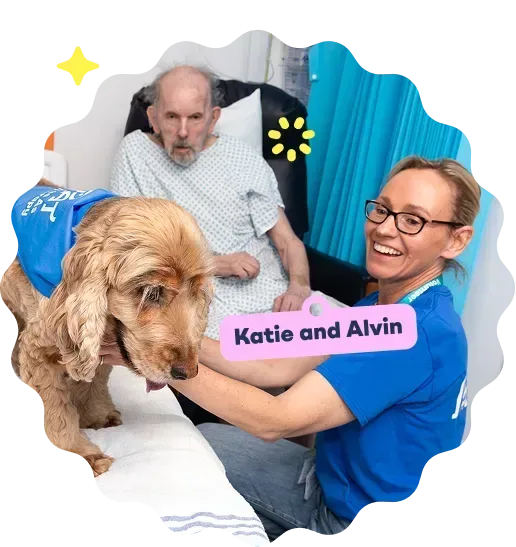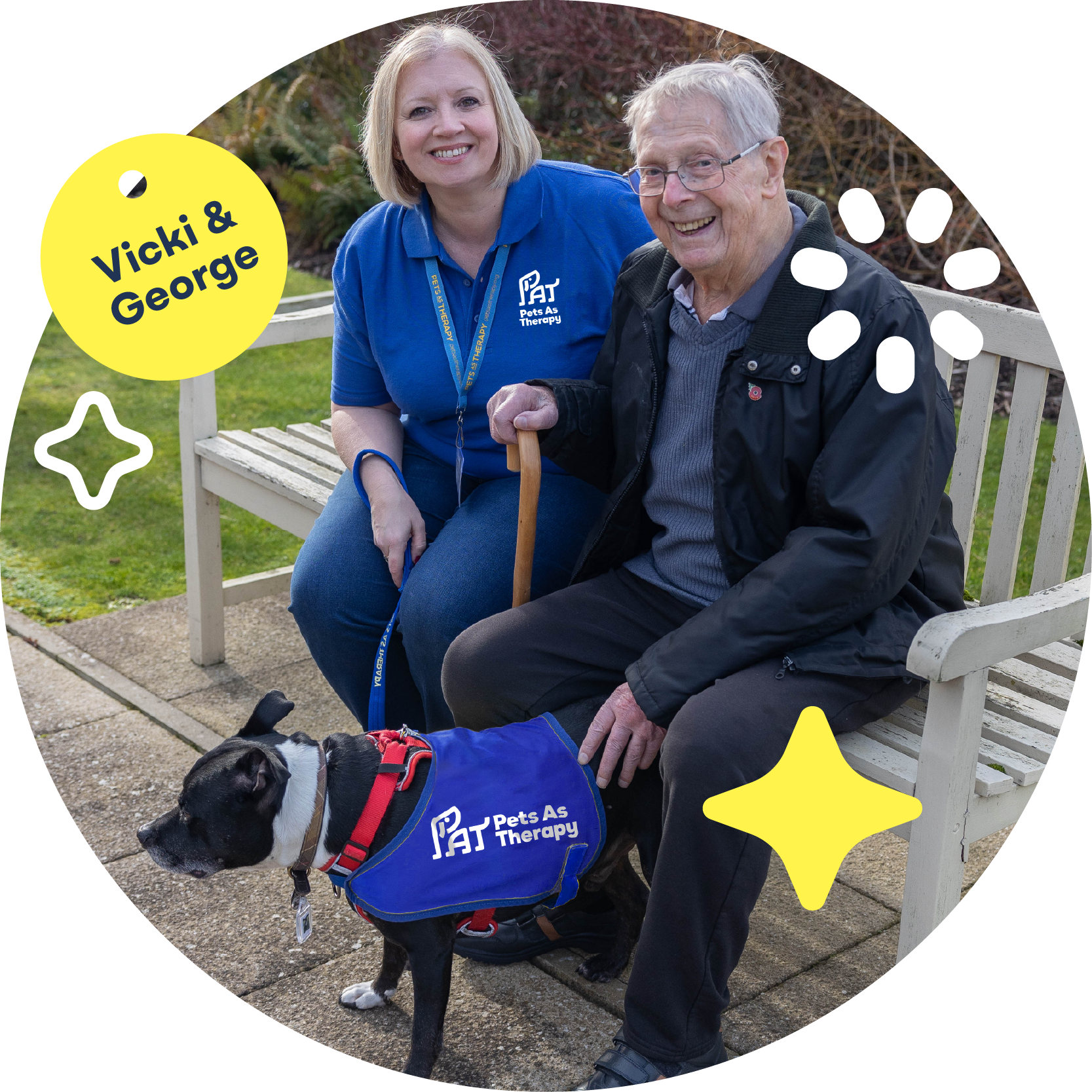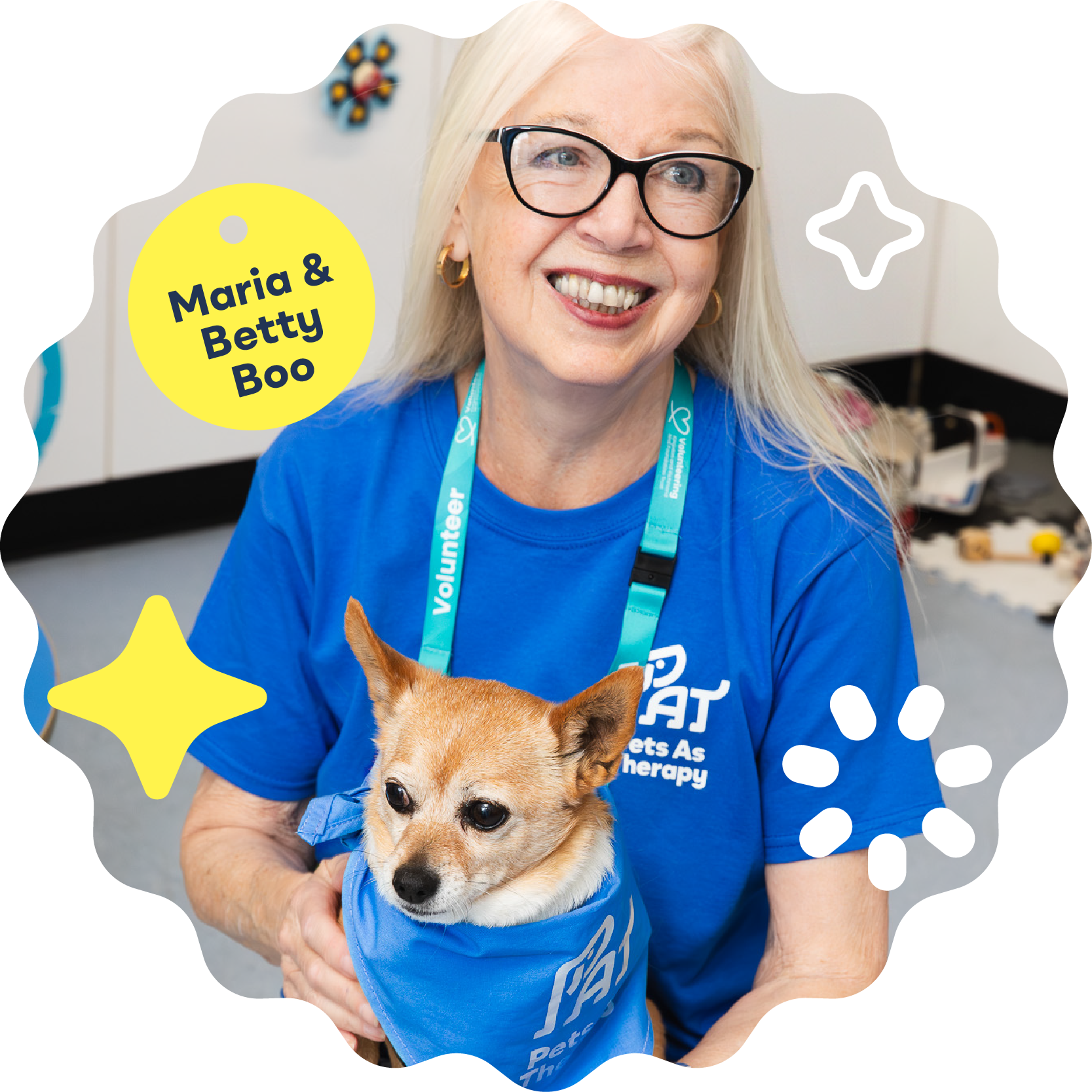Volunteer with your dog


Spread the joy with your furry friend
Our PAT Dogs love meeting new people and relish being touched and stroked. Volunteers and their pet dogs spend time with patients in hospitals, residents in care homes and they also support children in schools.
It's really easy to be a PAT Visiting Volunteer in your local area. We just need to find out a bit more about you and your pet, and then we'll help you get started.
Would me and my dog make a great PAT team?
If you're confident and comfortable chatting to new people from lots of different backgrounds, you're off to a great start.
And if you can say yes to all of our 5 questions, then we'd love you to apply to be a volunteer.

How to apply
To volunteer with Pets As Therapy, all you need to do is apply online and give us:
- Details about you and your pet – including up-to-date vaccination certificates from your vet.
- Contact details of two people (not family) who are happy to act as a referee.
You'll then meet a PAT Assessor who will chat to you and check your pet’s suitability.
All volunteers need to complete online Safeguarding training to keep you and your pet safe on every visit, as well as the people you meet.
Finally, volunteers are asked to pay an annual £25 contribution which helps to fund our admin costs and third-party insurance cover for PAT Teams.

Volunteering is such a wonderful thing to do. I enjoy the interactions with many people from all walks of lifeRead Maria's story
Frequently asked questions
Need more help? Take a look at our FAQs.
PAT Pets come in all shapes and sizes and can be a pedigree or a crossbreed – though we cannot accept dogs that are listed under the Dangerous Dogs Act 1991.
Your dog must be at least a year old and you must have known them for at least nine months. They must also have up-to-date vaccinations, a regular worming treatment and be protected against fleas. Your dog will have an assessment to ensure it has the right temperament for PAT visits.
Our PAT Pets give so much during visits and it’s important to consider their wellbeing too. If your dog is older, starting this new venture might be too demanding. Visiting unfamiliar and sometimes busy environments can be stressful and may worsen existing health conditions.
Before you apply, please consider if your dog will happily manage walking round a busy, unfamiliar building, meeting new people for two hours. This may depend on your dog's age, health, breed and existing level of activity. If your dog would struggle with this, volunteering with PAT may not be for them. If you are unsure, please have a chat with your vet before applying.
There is a risk that dogs on a raw food diet can pass on pathogens such as Salmonella. We put safety and welfare at the heart of our work and so are proud to follow guidance from the Intensive Care Society and the Royal College of Nursing which states visiting therapeutic pets cannot be on a raw food diet.
For more, see a statement from the International Association of Human-Animal Interaction Organizations.
Many imported dogs have become great PAT Dogs, however, if your dog was imported into the UK, we will require some additional information from you before we progress your application.
We will need evidence that your dog has been tested for Brucella canis and Leishmania.
- Imported PAT Pets must never have tested positive for Leishmania.
- Imported dogs must have confirmed negative tests for Brucella canis. Canine Brucella antibody testing must be conducted using an ELISA (enzyme-linked immunosorbent assay) at a validated laboratory before being accepted as a PAT Dog, and the outcome confirmed by a veterinary surgeon. This must be the result of two negative Brucellosis tests, at least 30 days apart.
An accredited PAT Assessor will meet you and your pet at a convenient public location. The assessment should last around 45 minutes and it enables us to make sure your dog is friendly, sociable and calm, and enjoys being stroked and handled.
We also check that your dog is fit, healthy, clean and well-groomed, and will behave appropriately under demanding social and physical situations. We find out a bit more about you, too.
You should bring your dog's favourite treats, grooming equipment and vaccination details with you.
For more information, see our PAT Dog Assessment Factsheet.
If your dog does not meet our assessment requirements your dog will be deferred.
You will be given clear explanation on why your pet has not passed the assessment on this occasion, guidance on how to improve and a timeline for a reassessment. The most common causes of deferral are:
Socialisation needs: Pets that are not comfortable around strangers or children should be further socialised before taking their reassessment. Pets who are nervous in a new environment will also need further socialising.
Behavioural training: Pets that jump up, paw or claw, vocalise or lick, or pull on the lead, will require additional training.
For more information, see our PAT Dog Assessment Factsheet.
You don't have to wear a PAT uniform on visits, but we encourage it so everyone knows who you are. A T-shirt and dog bandana are provided free of charge to all new volunteers. You must always display your ID badge while on visits and when representing PAT at events.
Some of the places you visit may also have their own rules about uniforms.
Volunteers are required to pay an annual contribution to PAT, which is currently £25 (or £35 for a joint contribution). This is an important contribution to our running costs and also covers third-party insurance cover for PAT Teams. If you are struggling to afford this, please talk to us.
Expenses may be reimbursed by some of the places you visit. Please ask the establishment about this before you start visiting.
There is no set requirement on how often you need to make PAT visits, but regular visits are greatly appreciated by all those who receive them. Most volunteers will visit once a week or once every two weeks. Please discuss this with the place you intend to visit.
No, Pets As Therapy does not assess or provide working or school pets. As a PAT Volunteer, your primary responsibility is to your dog and you are unable to do this if you're teaching a class.
For more information about school dogs, visit National School Dog Alliance.
Yes, visit Volunteer with my cat to find out more.


